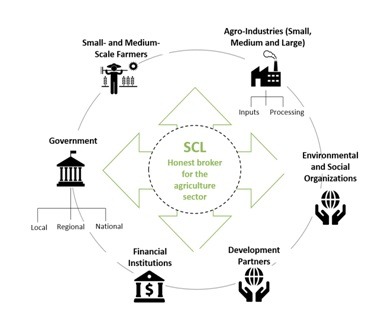Recent Posts
Get in touch!
Fusce varius, dolor tempor interdum tristiquei bibendum service life.
Fusce varius, dolor tempor interdum tristiquei bibendum service life.

To support and uphold the Partnership Principles and help each member understand what is expected of them, and what their roles and responsibilities are within the SAGCOT framework.
By providing a professionally credible focal point to help partners plan, implement and review their own activities and link them to a wider set of ongoing and planned SAGCOT-related activities.
SCL was designed to be a partner identifier and convener, under the premise that while many organizations are already engaging in the agriculture sector, they could benefit from the added coordination to concentrate, streamline, and amplify their efforts to create synergy and larger impact
Although each member will be responsible for monitoring their own development within the corridor, the SAGCOT Centre will track overall progress. This will include the number, volume and impact of investments and the growth and profitability of large, small and medium-scale commercial agriculture in the corridor. Environmental and social impact, poverty reduction and the role of women and youth are also to be assessed (See IGG Tool https://sagcot.co.tz/index.php/sagcot-investment-project/#1603184214831-775007fe-98e0 )
sharing the SAGCOT objectives for responsible commercial growth and food and nutrition security. This includes the need for commercially viableagricultural businesses to incorporate emergent and small-scale farmers and their interests into their operations.
To support the SAGCOT Centre in its work. Until such time as the benefits become evident, the underlying trust and intrinsic goodwill of each member will be essential to maintain progress.
which are aimed at catalyzing additional private investment in SAGCOT in ways that ensure major benefits also accrue to smallholder farmers. This will require creative investment, and the willingness of farmers and agri- business to accept new types of risk and modifications to traditional practices.
SCL was designed to support industrial investment in the agriculture sector, working with current and potential investors – including farmers and SMEs – to identify and realize investment opportunities.
Through its value chain partners, SCL was designed to empower and strengthen small-scale farmers towards enabling farming as a business and integrated with farmer production systems for markets and value chain development.
SCL was designed to interface with policy-makers to enhance visibility into actor needs and help identify priority policy areas for the advancement of the sector.
so that within their own particular sphere of activities, each member will cooperate with the overall, coordinated SAGCOT programme of planning, investment, implementation and policy
by bringing to the attention of the SAGCOT Centre their own concerns about specific factors that currently hinder local and national development of commercial agriculture. Members at all levels must be prepared and able to contribute to identifying and the resolution of these impediments, each according to their role and
(to get the guiding tools, please visit http://sagcot.co.tz/index.php/mdocuments-library/ )
| Organization Type | Annual Fee |
|---|---|
| Large Companies (Global Turnover -> USD 5 million) | TZS 4,000,000 |
| Medium Companies (USD 1 million <- Global Turnover <- USD 5 million) | TZS 1,000,000 |
| Small Companies (Global Turnover <- USD 1 million), Development Partners, Research Organizations, CSOs and Government Agencies or Institutions | TZS 250,000 |
| Apex or Farmer Organization | TZS 50,000 |
Development partners, along with Government Ministries, and Knowledge and Academia Partners will also be members of the partnership, however given their significant contributions to the funding of the SAGCOT Centre and/or within the corridor itself they will not be expected to pay the membership fee. All fees are renewed annually from 1st January. Non-payment of fees within three years consecutively will result in membership being first suspended and then withdrawn completely.